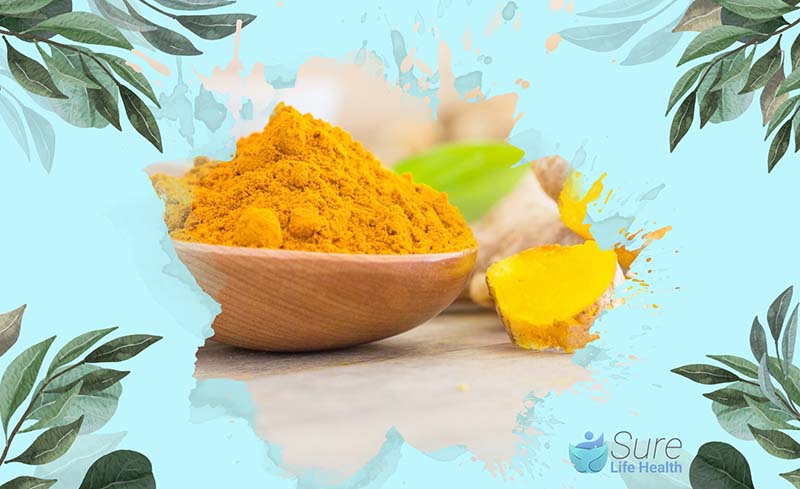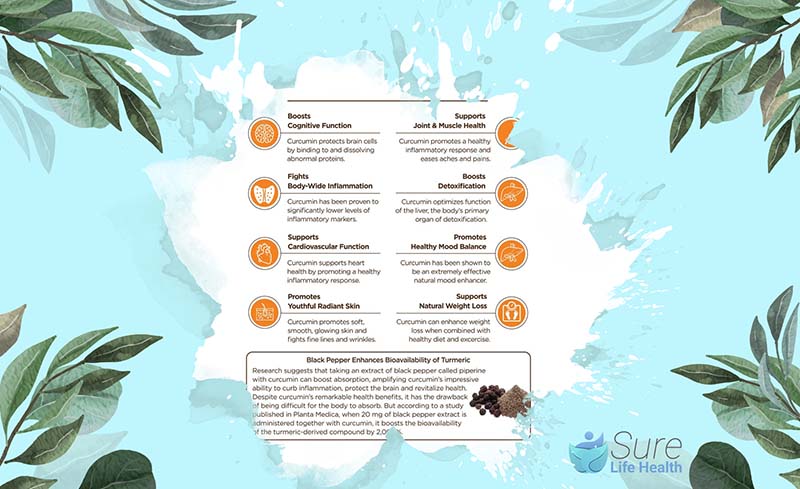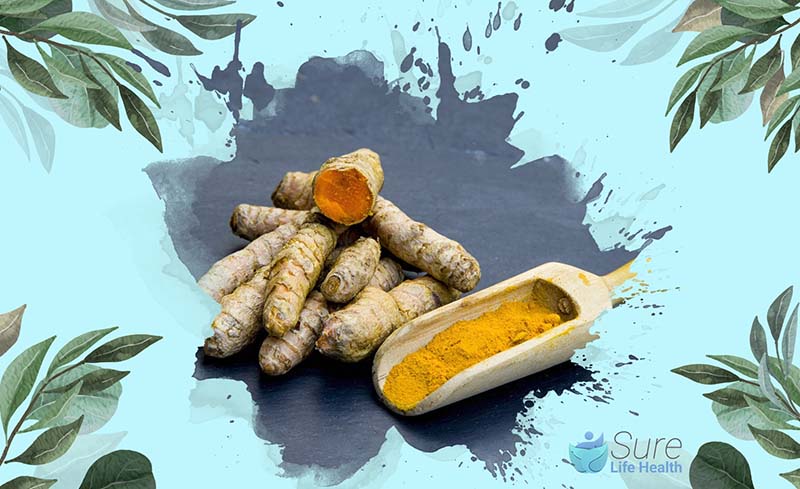Turmeric, known for its active ingredient Curcuma longa, offers several health benefits, including the potential to improve erectile function and sexual satisfaction.
This versatile herb is used in cooking, skincare, and traditional medicine and is believed to help men experiencing erectile dysfunction (ED). In this article, we will examine if turmeric can aid in managing ED, how to incorporate it into your routine, precautions to consider, and its wide range of health advantages.
Notes: You can find turmeric in various forms like pills, powders, and extracts, but effectiveness may vary. Combining turmeric with a healthy diet and exercise is recommended for best results.
Does Turmeric Help With Erectile Dysfunction?
Erectile dysfunction (ED) affects around 30 million men in the United States, with various potential underlying causes contributing to this condition.
Finding a treatment for ED depends a lot on each individual’s circumstance. Some people might do well with just medication, while others might need a mix of different treatments. But what about turmeric? Does Turmeric Help With Erectile Dysfunction?
Firstly, it’s important to note that curcumin, the active compound in turmeric, is renowned for its antioxidant, heart-protective, and anti-inflammatory properties. However, there’s insufficient specific evidence to support turmeric as a primary management strategy for ED and sexual health.
Although some studies have shown promising results in animal testings, these results may not always apply directly to humans. Thus, more research is needed to fully understand how effective turmeric can be in treating ED before it is recommended as part of treatment strategies.

Should I Use Turmeric to Help Treat Erectile Dysfunction?
When dealing with erectile dysfunction (ED), it’s best to go for medical treatment rather than relying on turmeric. While turmeric has its health perks, it’s not the go-to solution for ED.
ED, though not usually life-threatening, can seriously affect your sex life and might signal bigger health problems like diabetes or heart issues. That’s why it’s crucial to see a doctor if you’re experiencing ED symptoms. They can give you the right medications and advice tailored to your needs.
Keep in mind, your doctor is there to support you—they can determine the cause of your ED and assist in developing the most effective treatment plan for you, which goes beyond just using natural ingredients.
Notes: Turmeric might be good for you, but it’s not n ultimate answer for ED.
Additional Benefits of Using Turmeric
Turmeric provides more than just flavor – it comes with a range of health benefits:
Antioxidant Power: Turmeric contains compounds that act as antioxidants, shielding your body from harmful free radicals. These troublemakers can speed up aging and lead to diseases. Curcumin, found in turmeric, helps reduce levels of these free radicals, protecting your body from oxidative damage caused by reactive oxygen species like hydrogen peroxide, superoxide, and nitric oxide.
Anti-Inflammatory Properties: Research suggests that turmeric has anti-inflammatory properties, meaning it can help your body fight off foreign substances and aid in repairing damage. By tackling chronic inflammation, turmeric indirectly contributes to managing conditions like heart disease, metabolic syndrome, cancer, degenerative diseases, and Alzheimer’s.
Skin Health Booster: Turmeric isn’t just for cooking—it’s been used for ages as a natural skin cleanser, adding a radiant glow. It’s even included in pre-wedding ceremonies to give the bride and groom that extra glow. Studies indicate that turmeric may also assist in treating various skin issues such as psoriasis, acne, eczema, and photoaging.

Anti-Aging Support: Curcumin is a potential anti-aging supplement. Research shows that curcumin’s antioxidant and anti-inflammatory properties, along with its ability to delay brain aging and combat age-related diseases, make it a promising tool in the fight against aging.
Incorporating turmeric into your diet or skincare routine could offer a range of health benefits, from protecting against diseases to promoting youthful skin.
Notes: Turmeric’s benefits extend beyond the kitchen – its antioxidant and anti-inflammatory properties make it a valuable addition to your health regimen.

Notes When Using Turmeric
While turmeric isn’t a recommended treatment for erectile dysfunction, if you’re considering it for other health benefits, here are some important notes to keep in mind:
- Potential Interactions: Turmeric’s active compound, curcumin, can interact with certain medications and medical conditions. For instance, turmeric acts as a blood thinner, so it’s crucial to avoid turmeric or turmeric supplements if you’re taking blood-thinning medications. Combining these could heighten your risk of bleeding and bruising, and may even reduce the effectiveness of your medications.
- Common Blood-Thinning Medications: Some examples of blood-thinning medications include Apixaban (Eliquis), Aspirin, Cilostazol, Clopidogrel (Plavix), Dabigatran (Pradaxa), Eptifibatide (Integrilin), Heparin (Innohep), Ibuprofen (Advil, Motrin, others), Parsugrel (Effient), and Naproxen (Anaprox, Naprosyn, others).
Always consult with your healthcare provider before incorporating turmeric or any supplements into your routine, especially if you’re taking medications or have underlying health conditions. They can provide personalized guidance to ensure your safety and well-being.
Notes:
- Turmeric can interact with medications, particularly blood thinners, so it’s essential to consult your doctor before using it as a supplement.
- Always disclose all medications and supplements you’re taking to your healthcare provider to avoid potential interactions and complications.
Any Disease Should Not Use Turmeric?
Bleeding Disorders
Turmeric has blood-thinning properties, which can elevate the risk of bruising and bleeding, particularly in individuals with bleeding disorders. This risk is amplified for those using injectable blood thinners.
Liver Failure
There’s a potential risk of liver damage associated with turmeric, especially for individuals with existing liver disease. It’s advisable to avoid turmeric supplements if you have liver problems.
The Body Lacks Iron
High doses of turmeric may hinder the absorption of iron in the body. Therefore, individuals with iron deficiency should exercise caution when using turmeric.
If you have any of these conditions, it’s crucial to consult with your healthcare provider before incorporating turmeric into your diet or supplement regimen. They can provide personalized advice considering your health status and potential interactions with any medications you may be taking.
Notes: Turmeric may not be suitable for individuals with bleeding disorders, liver disease, or iron deficiency due to potential risks and interactions.
The Most Effective Way to Drink Turmeric
Incorporating turmeric into your daily routine can be both delicious and beneficial for your health. Here are three effective ways to consume turmeric:
- Golden Milk: This traditional drink from Ayurveda involves mixing turmeric into warm milk, usually enjoyed before sleep. Begin by warming up ½ teaspoon of turmeric paste with a bit of ghee or coconut oil. Stir this into the milk and add a pinch of black pepper to help your body absorb the turmeric better. For more taste, add a little cinnamon powder and honey. You might also want to include some nuts and seeds for extra nutrition.
- Turmeric Tea: Make a soothing turmeric tea by boiling water with ¼ teaspoon of turmeric powder or fresh turmeric grated. After letting it simmer for some time, add a bit of fresh lemon juice and honey to make it tastier.
- Turmeric Smoothies: Consider replacing your morning coffee with a smoothie that includes turmeric for its anti-inflammatory benefits. Just add a small amount of turmeric to any smoothie you like, such as ones made with berries, mango and peach with coconut water, strawberry and kale with orange and almond milk, or pineapple with coconut and chia seeds. This way, you get to enjoy turmeric’s health perks in a tasty and refreshing morning drink.
By incorporating turmeric into your daily routine through these simple yet effective methods, you can enjoy its numerous health benefits and enhance your overall well-being.
Notes:
- Adding black pepper to golden milk enhances turmeric absorption, while lemon juice and honey complement the flavor of turmeric tea.
- Experiment with different smoothie recipes to find your favorite combination with added turmeric for a health boost.

Does Using Turmeric Have Side Effects?
While turmeric is generally safe for most people, there are some potential side effects to be aware of:
- Gastrointestinal Issues: In higher doses, turmeric may cause gastrointestinal discomfort such as nausea, diarrhea, and abdominal pain. Consuming turmeric with meals can help minimize these side effects.
- Allergic Reactions: Some individuals may experience allergic dermatitis reactions to turmeric.
It’s important to note that turmeric can interact with certain health conditions and medications. Therefore, it’s advisable to consult with your healthcare provider before incorporating turmeric into your diet, especially if you have any preexisting health conditions or are taking medications.
Notes: Turmeric may cause gastrointestinal discomfort and allergic reactions in some individuals, especially at higher doses.
How Much Turmeric Should I Take for Health Benefits?
Determining the appropriate amount of turmeric for health benefits can vary depending on individual factors such as weight, overall health, and specific health goals. While the World Health Organization (WHO) and the European Food Safety Authority (EFSA) suggest that up to 3mg of curcumin (the active ingredient in turmeric) per kilogram of body weight per day is generally safe, there is no widely agreed-upon definitive therapeutic dosage in clinical trials.
It’s important to discuss the appropriate dosage with your healthcare provider, as they can provide personalized guidance based on your individual health status and needs. Your doctor can help you determine the optimal amount of turmeric to incorporate into your diet or supplement regimen to achieve potential health benefits while ensuring safety and effectiveness.
Notes: While WHO and EFSA provide a general guideline for turmeric dosage, therapeutic levels may vary and should be discussed with a healthcare professional.
Conclusion
In conclusion, while turmeric shows promise as a natural remedy for various health concerns, including erectile dysfunction, it’s essential to approach its use with caution and consult with a healthcare professional. We’ve explored the question, “Is turmeric good for erectile dysfunction ?” shedding light on this topic to help you make informed choices about your well-being.
We invite you to share your experiences and insights in the comments below. And don’t forget to explore more informative blogs from Sure Life Health for additional valuable insights on health and wellness, including the benefits of turmeric. Your journey to better health starts right here.
Be sure to explore more insightful blogs from Sure Life Health, where we continue to shed light on the latest trends and breakthroughs in health and wellness.
Professor Gaye Cunnane, PhD, MB, FRCPI
As the Director of Health and Wellbeing at RCPI, Professor Gaye Cunnane is at the helm of initiatives aimed at enhancing the health and well-being of RCPI Trainers and Trainees. Her role extends beyond administration; she is also a respected clinical professor of rheumatology and a consultant rheumatologist at Trinity College Dublin (TCD) and St James’s Hospital. Prof. Cunnane’s medical journey began at TCD, where she graduated from medical school, and her path has been marked by both clinical and academic excellence.
After completing her basic clinical training in medicine, she embarked on PhD studies at University College Dublin and St Vincent’s University Hospital. Her research during this period was focused on prognostic markers in early inflammatory arthritis, a project that saw her collaborating with esteemed universities across Europe, including in Switzerland, The Netherlands, the UK, and Sweden.
Prof. Cunnane’s career took her to the University of California, San Francisco, where she spent three years delving into research on new treatments for lupus. Her academic prowess led her to the University of Leeds in 2001 as a senior lecturer, before returning to Ireland in 2003 to assume her current roles. She has also served as the National Specialty Director for Rheumatology training in Ireland, Programme Director for Basic Specialist Training with RCPI, and as a past President of the Irish Society for Rheumatology.
PUBLISHED ARTICLES
“Rheumatic disease differentiation using immunoglobulin G sugar printing by high-density electrophoresis”: Published in The Journal of Rheumatology, this study reflects her in-depth investigation into rheumatic diseases.
“Benefits of exercise in patients with rheumatoid arthritis: a randomized controlled trial”: This research work, highlighting the positive impact of exercise on rheumatoid arthritis, underscores Prof. Cunnane’s dedication to practical, patient-centered research.
Additionally, Prof. Cunnane has made notable contributions to the Annals of the Rheumatic Diseases, discussing early referral, diagnosis, and treatment of rheumatoid arthritis. She has also been involved in a study on the NCBI platform investigating exercise benefits in rheumatoid arthritis patients.
Professor Gaye Cunnane’s career is a testament to her commitment to improving patient outcomes in rheumatology through rigorous research, clinical excellence, and dedicated teaching. Her work continues to influence the field of rheumatology, both in Ireland and internationally.

